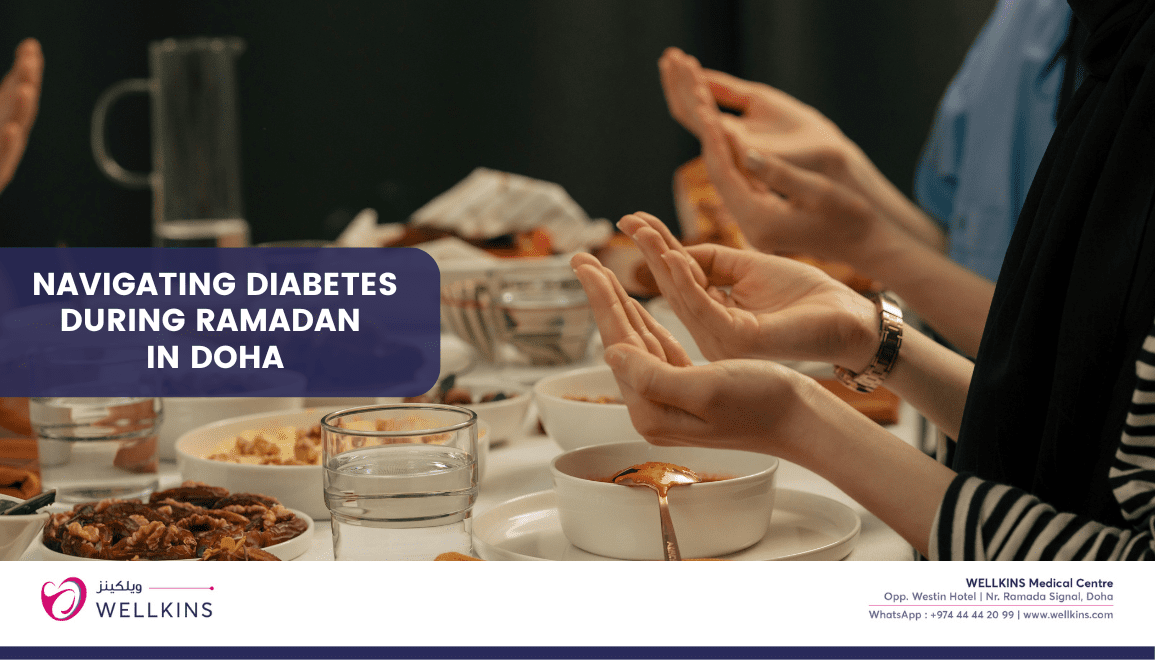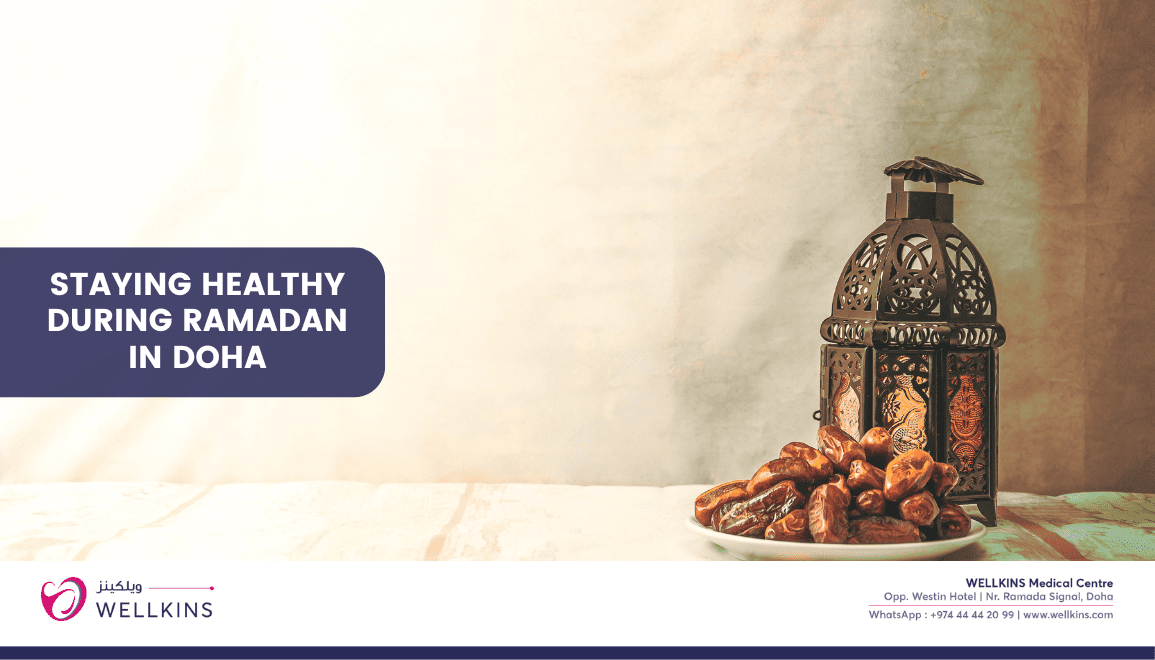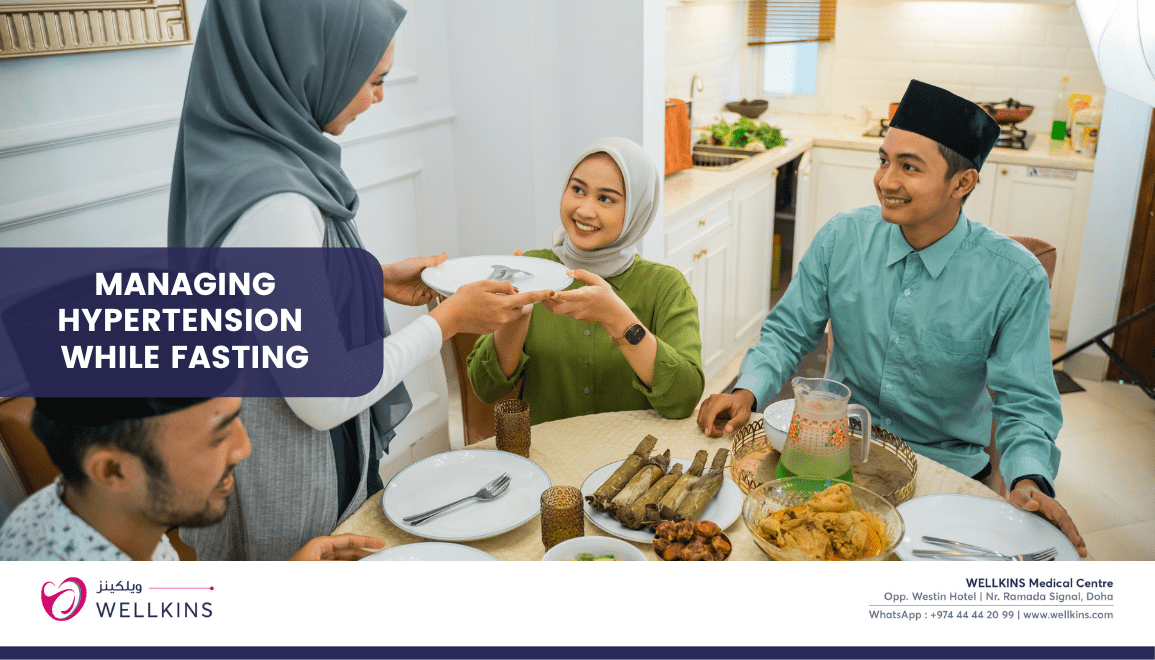Author:Dr. Ayisha Anwar (General Practitioner – WELLKINS Medical Centre)
As the blessed month of Ramadan unfolds, Muslims around the world embark on a period of fasting, reflection, and spiritual growth. However, for individuals with pre-existing health conditions like diabetes or hypertension, navigating the daily fast can present unique challenges. Healthcare professionals offer valuable insights and practical tips to help you fast safely and maintain your well-being throughout Ramadan.
Ramadan and Your Health
Ramadan is a significant time, but it’s important to be mindful of your health while fasting. Medical experts recognize the potential health concerns that may arise during this time and provide guidance on fasting safely.
For those managing diabetes, careful meal planning is paramount. It’s emphasized that a balanced suhoor (pre-dawn meal) should include slow-release carbohydrates and a good source of protein. These food choices help sustain energy levels throughout the fasting hours.

Navigating Diabetes During Ramadan:
For those managing diabetes, careful meal planning is paramount. It’s emphasized that a balanced suhoor (pre-dawn meal) should include slow-release carbohydrates and a good source of protein. These food choices help sustain energy levels throughout the fasting hours.
When it’s time for iftar (the evening meal to break the fast), it is advised against indulging in sugary drinks, which can cause rapid spikes in blood sugar. Instead, opt for water to rehydrate, start with dates, and then proceed to a balanced meal.
Crucially, regular blood sugar monitoring is essential for individuals with diabetes. Paying close attention to your body’s signals and consulting your doctor if you experience any feelings of unwellness is necessary for safe fasting.
Here are 10 health tips for managing diabetes during Ramadan, based on expert guidance:
- Consult Your Doctor: Before Ramadan, talk to your doctor to create a personalized fasting plan.
- Balanced Suhoor: Eat a suhoor meal with slow-releasing carbohydrates (like oats) and protein.
- Hydrate Well: Drink enough water between iftar and suhoor to stay hydrated.
- Avoid Sugary Drinks: At iftar, avoid sugary drinks to prevent blood sugar spikes.
- Eat Dates in Moderation: Enjoy dates at iftar, but limit portion sizes.
- Balanced Iftar: Break your fast with a balanced meal that includes all food groups.
- Monitor Blood Sugar: Check your blood sugar levels regularly, as advised by your doctor.
- Recognize Hypoglycemia: Be aware of the signs of low blood sugar (dizziness, sweating, confusion).
- Recognize Hyperglycemia: Be aware of the signs of high blood sugar (increased thirst, frequent urination, blurred vision).
- Break the Fast When Needed: If you feel unwell, dizzy, or extremely tired, break your fast and seek medical advice.
Managing Hypertension While Fasting:
Individuals with hypertension also need to take specific precautions during Ramadan. Reducing the intake of salt in meals is advised, as excessive sodium can elevate blood pressure. Avoiding fried foods, which are often high in unhealthy fats and sodium, is also recommended.
Staying adequately hydrated between iftar and suhoor is vital for managing blood pressure. Drinking plenty of water and considering electrolyte-rich beverages like coconut water can help replenish lost fluids and maintain electrolyte balance.
Here are 10 health tips for managing hypertension during Ramadan:
- Consult Your Doctor: Talk to your doctor before Ramadan to adjust your medication schedule and discuss safe fasting.
- Limit Salt Intake: Reduce salt in suhoor and iftar meals to help control blood pressure.
- Avoid Processed Foods: Limit processed and packaged foods, which are often high in sodium.
- Stay Hydrated: Drink plenty of water between iftar and suhoor.
- Eat Potassium-Rich Foods: Include potassium-rich foods like bananas, dates (in moderation), and leafy greens in your meals.
- Control Portion Sizes: Avoid overeating at iftar to prevent a sudden increase in blood pressure.
- Limit Fried Foods: Minimize consumption of fried and fatty foods.
- Monitor Blood Pressure: Check your blood pressure regularly, as advised by your doctor.
- Avoid Smoking: If you smoke, Ramadan is an excellent time to quit, as smoking can significantly raise blood pressure.
- Get Enough Rest: Ensure you get sufficient sleep to help manage blood pressure levels.
Prioritizing Your Well-being:
It is important to listen to your body. If anyone fasting experiences symptoms such as dizziness or extreme fatigue, or simply feels unwell, it is crucial to break the fast immediately and seek medical advice.
By following these practical tips, individuals with diabetes and hypertension can approach Ramadan with greater confidence, ensuring a safe and healthy fasting experience. Ramadan Mubarak!







